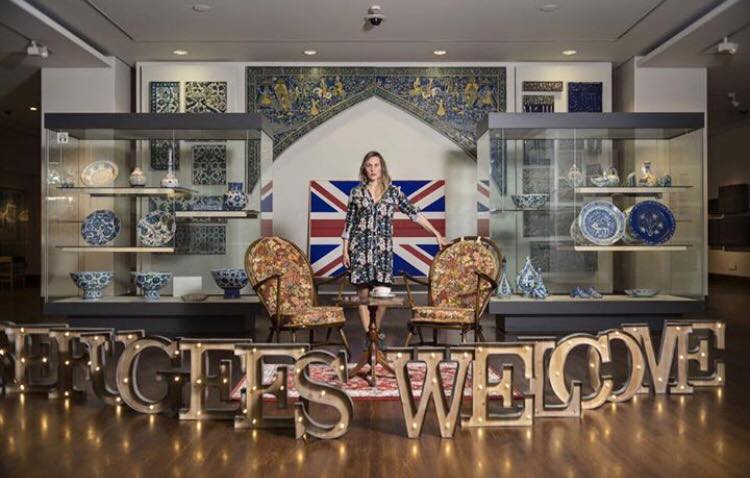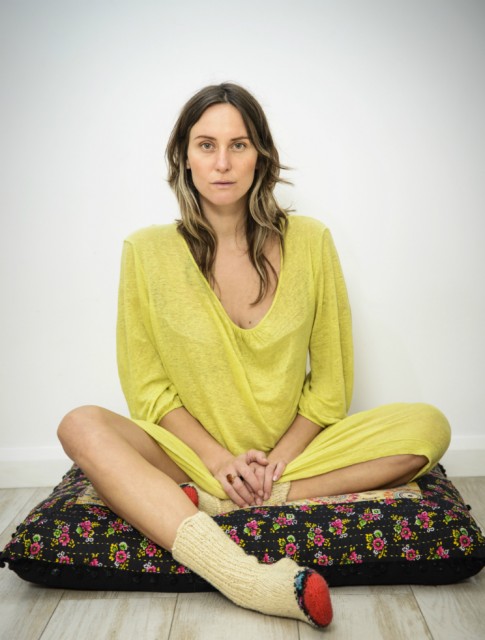“Britain symbolises the hope and the welcome”: Alketa Xharfa-Mripa On Refugees Welcome

Ahead of a major solidarity march in London this weekend, Bob Dickinson speaks to Kosovo-born artist Alketa Xharfa-Mripa about her special truck-based installation; what it feels to be a student-turned-refugee; and how her artwork is making a vital space for discussion…
This year’s Solidarity With Refugees March in London features an unusual artistic intervention: a truck containing an English living room. The idea is that anyone can go inside, sit down, have a cup of tea, and talk about the refugee situation with the artist, Alketa Xharfa-Mripa (pic, below), who was born in Kosovo.
“I wanted to create a welcoming room where it felt how I felt when I came to London in 1997,” Alketa tells me, “I didn’t come as a refugee, I came as a student, but then I turned into a refugee because of the war. And I used to work with the Red Cross at that time in Manchester and Liverpool, so I could see the solidarity, and that opening of the heart and homes of British people, and I was amazed by the welcome that they showed. So for me, Britain symbolises the hope and the welcome. And then obviously, in the last three or four years the situation –the response towards the refugees - has changed, both politically and emotionally”.
The core of her installation, entitled Refugees Welcome (above), is described by Alketa as being: “Very English, 1970s design, with two old chairs and a table and a carpet, and lamps, a very conservative setting.” It was first shown, briefly and without the truck, at the British Museum, in June. The timing was auspicious, as she explains.
“The beauty of it was, the day that I exhibited it was the day the Brexit vote came. At the British Museum on the night of the opening, I wanted to serve tea in teacups, welcoming the refugees, but on the day, one of the teacups broke, and I was really angry because I bought them in a charity shop so I couldn’t find exactly the same teacup. And then I left it because when I heard about the Brexit vote, I thought, this is a sign. Britain was alone, broken, and it was tea for one!”

The installation also contains: “A big leather diary where I want people to tell me their stories, of being refugees, how they came, and what Britain means to them. And on the other side, about refugee issues, about what Britain is doing towards refugees at the moment.” At the British Museum, “The whole notebook was full of anger because of the Brexit vote as well. It’s all been documented.” After the whole book gets filled, possibly this Saturday, Alketa hopes to turn its contents into another new exhibition.
The idea for the truck, she says: “Came from last year, as I was travelling from Calais to London and I was crossing the Channel. I could see loads of people waiting for the trucks, so they could get in illegally and cross the Channel. So the truck symbolises the freedom and hope of crossing and coming to a new country, and at the same time it can turn into a tomb because they can suffocate, they can freeze inside”.
Commissioned by Counterpoint Arts – an organisation that works with artists and refugees – Alketa describes her work as: “A kind of activism art, because it’s important to involve people in the process”. Refugees Welcome follows on from Alketa’s previous major project, staged in Pristina, capital of Kosovo, in 2015. Entitled Thinking of You (feature image), it concerned the crime of rape, committed against thousands of women during the war between Serbia and the Kosovo Liberation Army during the late 1990s. A tribute to the 20,000 survivors of wartime sexual violence, the work aimed to “air dirty laundry in public”, using skirts and dresses collected from Kosovan women, hanging from clotheslines suspended across the city’s main football stadium.
“Basically, people were talking about rape and the things that happened. It was an open secret. But nothing was being done”, Alketa recalls. “So what I did when I put 5,000 dresses across the football pitch, and I got involved with the government, was I then got involved with the whole society because the whole point was rape victims were being stigmatised by society. So it was being faced with the reality of the rape that happened. And that’s where art broke through where language failed, because it was using a visual language understood by all, no matter what nationality or religion.”
Bob Dickinson
The Solidarity With Refugees March takes place this Saturday 17 September 2016 in Central London, starting at 12.30pm. The Refugees Welcome truck-installation will be parked at the meeting point, on Park Lane and Curzon Gate, in between the South-bound and North-bound junctions. The march goes on to Parliament Square





